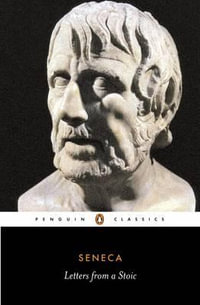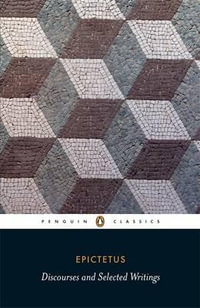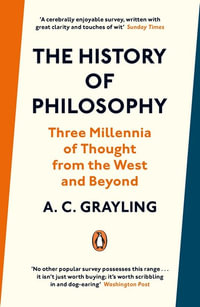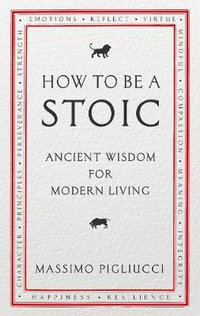
At a Glance
Hardcover
$39.18
or
Aims to ship in 7 to 10 business days
When will this arrive by?
Enter delivery postcode to estimate
Constantly regard the universe as one living being, having one substance and one soul; and observe how all things have reference to one perception, the perception of this one living being; and how all things act with one movement; and how all things are the cooperating causes of all things which exist; observe too the continuous spinning of the thread and the contexture of the web.A" Marcus Aurelius - 'Meditations' Marcus Aurelius is considered to one of the great Emperors of Rome who was not only a skilled military leader but also a great philosopher in the Stoic tradition. He was born in 121 AD and both of his parents came from wealthy backgrounds. His father died when Marcus was 3 years old and by the time he was 6 he had gained the attention of the Emperor Hadrian who oversaw his education. Hadrian ensured that Marcus was taught by some of the greatest scholars in Rome who educated him in literature, drama, geometry, Greek oratory, Greek and Latin. Marcus later abandoned most of those subjects in favor of philosophy, with the work of the Greek philosopher Epictetus being a major influence on his thinking.
In 138, while still a young man, the Emperor Antoninus Pius adopted Marcus, and in 161 he himself became Emperor. Marcus insisted he would only take up the Emperorship if Lucius Verus were also installed. Marcus's insistence on Lucius joining him as Emperor was a military one. At that time Rome was fighting wars on multiple fronts and Marcus wanted someone he could trust to marshal the troops who he knew would not at some point lead a revolt against him. Lucius and Marcus were loyal to each other up until Lucius's death in 169 AD. After Lucius's death, Marcus was the sole Emperor and due to the incessant wars in the provinces he was unable to spend much time indulging his philosophical pursuits. He did manage to found four Chairs of Philosophy in Athens, one for each of the main philosophical schools of thought, Aristotelian, Epicurean, Platonic and Stoic. Although Marcus spent almost all of his reign on campaigns in foreign territories, he managed to write down his thoughts and these became what are now considered a masterpiece of Roman philosophy, the discourses 'Meditations'.
Marcus wrote 'Meditations' around 170 - 180, whilst on a campaign in central Europe, most probably in what is now Serbia, Hungary and Austria. The 12 books that make up 'Meditations' were not written as an exercise in explaining his philosophy but rather as a personal notebook for self-improvement and study. 'Meditations' illustrates just how important Epictetus was to Marcus as he quotes the Greek philosopher's famed 'Discourses' on more than one occasion. Epictetus was a legendary figure in Greek philosophy and many claim he is the greatest of the Stoics; texts that remain in existence from the period suggest that in his native Greece, he was even more popular than Plato. As was previously mentioned, 'Meditations' was not written for public consumption but rather as an aid to personal development. Marcus wanted to change his way of living and thinking and to do this he embarked on a set of philosophical exercises. He would reflect on philosophical ideas and by writing them down and by repeating them he hoped to re-programme his mind and find his own philosophy to live by.
One of the key exercises in the book discusses Marcus attempting to look at the world from 'the point of view of the cosmos' in a bid to try and look at life and the universe outside of the common and limited parameters of individual concerns. You have the power to strip away many superfluous troubles located wholly in your judgment, and to possess a large room for yourself embracing in thought the whole cosmos, to consider everlasting time, to think of the rapid change in the parts of each thing, of how short it is from birth until dissolution, and how the void before birth and that after dissolution are equally infinite.A" Marcus Aurelius died on March 17, 180, in the city of Vindobona which was situated where Vienna is today. History remembers him as the last of the 'Five Good Emperors' of the Nervan-Antonian dynasty. Marcus' son Commodus replaced his father as Emperor and although he reigned over a relatively stable period in Roman history, in terms of war and peace, his personal behavior and antics were not in the spirit of those Emperors that came immediately before him.
Commodus was eventually murdered in a plot that involved his mistress Marcia, thus bringing to an end the highly regarded Nervan-Antonian dynasty.
ISBN: 9781907661716
ISBN-10: 1907661719
Published: 27th September 2010
Format: Hardcover
Language: English
Number of Pages: 164
Audience: General Adult
Publisher: White Crow Productions Ltd
Country of Publication: GB
Dimensions (cm): 21.59 x 13.97 x 1.27
Weight (kg): 0.35
Shipping
| Standard Shipping | Express Shipping | |
|---|---|---|
| Metro postcodes: | $9.99 | $14.95 |
| Regional postcodes: | $9.99 | $14.95 |
| Rural postcodes: | $9.99 | $14.95 |
How to return your order
At Booktopia, we offer hassle-free returns in accordance with our returns policy. If you wish to return an item, please get in touch with Booktopia Customer Care.
Additional postage charges may be applicable.
Defective items
If there is a problem with any of the items received for your order then the Booktopia Customer Care team is ready to assist you.
For more info please visit our Help Centre.

































